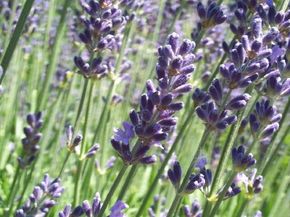Insect bites and stings are particularly common during the summer -- luckily, the same time your healing garden is at its peak. An herb garden can take away the "ouch" after a bite or sting.
A poultice of fresh plantain leaves is the easiest and safest remedy for mosquito bites and wasp stings. Plantain is an extremely common weed in yards and gardens but serves as an excellent medicine. Simply chew up a leaf (from a plant not sprayed with chemicals) and apply it to the sting.
Advertisement
Lavender oil is indispensable for this purpose. Keep it on hand to ease the discomfort of insect bites; rub a little onto the affected area. To make lavender oil, cover finely chopped lavender flowers with 1/4 inch vegetable oil; gently heat lavender and oil together until the mixture is warm and fragrant. Strain and store in a cool dark place. This mixture retains its healing properties for about six months.
Mosquito bites and wasp stings can also be treated with a lotion made of witch hazel, or use a strong infusion of plantain or witch hazel as a soothing wash. A swab of mint tea will put a stop to itching. Both chamomile and goldenrod poultices are very effective in preventing redness and swelling.
For bee stings, after the stinger is removed, run cold water over the stung area and then apply a paste made of baking soda or a plantain poultice. Use lavender oil later to calm the stinging. A marshmallow root or seed poultice soothes the inflammation and irritation that accompanies a sting.
A few herbs may help repel insects, possibly preventing bites and stings from occurring in the first place. Applied externally, wormwood, lavender, and citronella will deter some pesky bugs.
Wormwood is especially good for fleas, whereas lavender and citronella work well against mosquitoes. Infuse their essences into oils or creams, and apply to skin.
If you have severe or allergic reactions to bee or wasp stings, seek medical attention immediately.
For more information about the subjects covered in this article, try the following links:
- To see all of our herbal remedies, visit our main Herbal Remedies page.
- To learn more about treating common medical conditions yourself, go to our main Home Remedies page.
- To learn other ways you can treat the symptoms of prostate problems at home, read Home Remedies for Bites and Stings.
- To find out more about allergies, read .
- Find out more about lavender and the conditions it treats when you read Lavender: Herbal Remedies.
- Learn about wormwood and conditions that it's used for by reading Wormwood: Herbal Remedies.
Eric Yarnell, N.D., R.H. (A.H.G.) is a naturopathic physician and registered herbalist in private practice specializing in men's health and urology. He is an assistant professor in the botanical medicine department at Bastyr University in Seattle and is president or the Botanical Medicine Academy. He is the author of several textbooks including Naturopathic Gastroenterology, Naturopathic Urology and Men's Health, and Clinical Botanical Medicine; He writes a regular column on herbal medicine for Alternative and Complementary Therapies. This information is solely for informational purposes. IT IS NOT INTENDED TO PROVIDE MEDICAL ADVICE. Neither the Editors of Consumer Guide (R), Publications International, Ltd., the author nor publisher take responsibility for any possible consequences from any treatment, procedure, exercise, dietary modification, action or application of medication which results from reading or following the information contained in this information. The publication of this information does not constitute the practice of medicine, and this information does not replace the advice of your physician or other health care provider. Before undertaking any course of treatment, the reader must seek the advice of their physician or other health care provider.Before engaging in any complementary medical technique, including the use of natural or herbal remedies, you should be aware that many of these techniques have not been evaluated in scientific studies. Use of these remedies in connection with over the counter or prescription medications can cause severe adverse reactions. Often, only limited information is available about their safety and effectiveness. Each state and each discipline has its own rules about whether practitioners are required to be professionally licensed. If you plan to visit a practitioner, it is recommended that you choose one who is licensed by a recognized national organization and who abides by the organization's standards. It is always best to speak with your primary health care provider before starting any new therapeutic technique.
Advertisement
